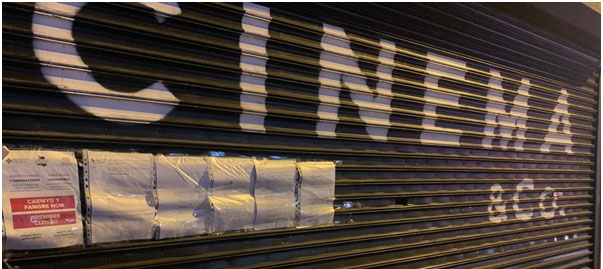Life and Times

She fought the law…
To Vax or Not To Vax
A woman in my own home town has made the national headlines by vowing not to apply the Wales Covid pass rule to people visiting the small independent cinema she runs. She said it was ‘nonsensical and unnecessary’ and she was determined ‘to take a stand’. The Covid vaccine passport for cinemas, theatres and concert halls was, she said, ‘an infringement of our human rights and discriminates against those exercising their right to bodily autonomy’. The Wales government said it was introducing the scheme in response to a sharp rise in coronavirus cases and the local authorities responded promptly to the cinema owner’s defiance by shutting down her venue and sticking up closure notices on it. When she attempted to defy the Council by re-opening, she was taken to court where she was ordered to pay the Council’s £5,000 legal expenses and faced imprisonment if she failed to comply. All this elicited a mass of comment on social media and very quickly, in an online appeal, several thousand people raised some £60,000 in support of the cinema and its owner.
Right and Left
What to make of this? Well firstly the issue was taken up and quickly became a cause célèbre among far-right groups. One group in particular calling itself ‘Voice of Wales’ and known for its open Islamophobia and anti-Semitism seized on this to urge people to attend the cinema and its café and form a ‘defence force’ to keep it open. This brought condemnation from the local left-organised ‘Stand Up To Racism’ group calling upon the owner to publicly distance herself from ‘Voice of Wales’ and its supporters. The owner announced that she owed no allegiance to any of these organisations and would not accept any money collected. She repeated that what she was protesting about was ‘an infringement on our fundamental and inherent rights’ (though later she said she would use the money ‘to support others’).
‘Rights’ and freedoms
But what are the ‘rights’ being talked about here and indeed frequently talked about over the last 20 months or so as, in an effort to combat the spread of Covid, governments have brought in laws and rules to curb or limit activities previously permitted? It’s a common belief that, under Western democracies at least, people have inalienable ‘rights’ which it’s illegitimate for governments to try and limit or remove. Among these are said to be the right to ‘free speech’, to peaceful assembly, to move around freely, to use our bodies as we wish, and so on. That’s one reason why the regulations brought in to try and deal with Covid have irked many people, since this has been seen as meaning that these ‘rights’ no longer exist, or at least not to the same extent as before. Of course some of the protesters, those from the extreme right wing of capitalist politics or harbouring fantastical conspiracy theories, have deliberately seized on the Covid restrictions to try and recruit supporters for their views or movements. But there are also many people who genuinely regard the measures, even if seen by most as sensible precautions, as irksome limitations on what they see as their rights or freedoms. The measures we are talking about are such as the compulsory wearing of masks, the prohibition on assembly and now the various regulations to push people into having anti-Covid vaccinations. Hence the protests about people needing to be in possession of ‘vaccine passports’ to attend cinemas, restaurants, etc.
Yet, without judging the efficacy or otherwise of mass vaccination (though this writer finds it hard not to see it as a sensible precaution), it is quite mistaken to think that, in trying to make it compulsory, governments or other authorities are somehow crossing a ‘rights’ line that is fundamental. We all know that the very idea of ‘rights’ is relatively recent. It’s an invention of governments overseeing the system we live under, that of wage and salary work and production for profit. Its underlying purpose is to gain the relative consent of those carrying out the work and ensuring profit is made for the owners of capital. So ‘rights’ form a sort of peace treaty between the ruling capitalist class and the working class allowing routine matters of potential conflict to be resolved and the system to operate in a way which is considered broadly fair by the wider population. But when that peace treaty breaks down, for example through war or unexpected external events such as a killer virus, those ‘rights’ can be easily modified or removed and then there can be open fighting between those who mistakenly considered the previous ‘rights’ situation ‘fundamental’ (such as the owner of ‘Cinema & Co’) and the authorities seeking to impose the new less ‘free’ regime. Disruption can take place and, as we have seen, can happen not only in this country but in the wider world.
Which system?
The plain fact is that, in the system of society we live in, ‘rights’ are not guarantees but, like all reforms instituted by that system, contingent and easily disposable measures. Some readers may remember the hapless ‘right to work’ campaign of the 1980s which fizzled out when it became obvious that the system that rules us does not and can never guarantee such a right. In the moneyless, wageless society of economic equality based on free access to all goods and services, instead of rights on paper, we would have the practical fulfilment of human needs with equal access to the democratic control necessary to secure those needs, making the whole concept of ‘rights’ redundant.
HOWARD MOSS
